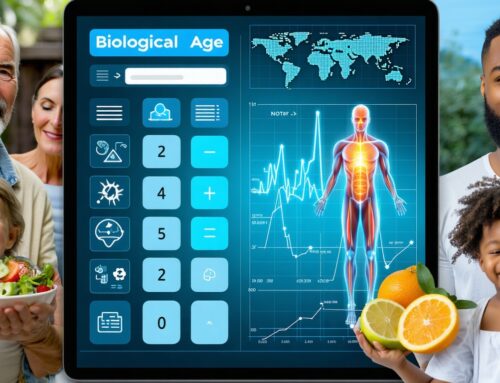Understanding Biological Age
Definition and Significance
Biological age is like the secret sauce of your body’s health, showing how spry you are compared to the candles on your birthday cake. While your chronological age is just a number, biological age digs deeper, revealing how your body is holding up based on a mix of factors and biomarkers. It’s a more personal peek into how you’re aging.
Getting a grip on your biological age can be a game-changer for your health. It shines a light on areas where you might need to tweak your lifestyle to boost your health and maybe even add a few more years to your life. Curious about how to figure out your biological age? Check out our guide on how to calculate biological age.
Factors Influencing Biological Age
Your biological age is shaped by a bunch of things, like your genes, how you live your life, and what you’re exposed to in the world. While your DNA only accounts for a small slice of the aging pie, how you live your life is a big deal in keeping you feeling young.
Here’s what can speed up the aging process:
- DNA Damage: Over time, your DNA can take a beating, speeding up the aging process.
- Oxidative Stress: When free radicals outnumber antioxidants, your cells can get damaged.
- Telomere Erosion: Those little caps on your chromosomes shrink as you age, leading to cell aging.
- Senescent Cells: These cells stop dividing and can stir up trouble with inflammation and tissue damage.
- Chronic Inflammation: Ongoing inflammation can put the pedal to the metal on aging.
| Factor | Impact on Biological Age |
|---|---|
| DNA Damage | Speeds up aging |
| Oxidative Stress | Causes cell damage |
| Telomere Erosion | Leads to cell aging |
| Senescent Cells | Stirs up inflammation |
| Chronic Inflammation | Speeds up aging |
Having a solid social circle is also a biggie for biological age. Folks who are more isolated tend to be biologically older than their actual age. Getting involved in community activities and keeping those social ties strong can give your biological age a boost. Dive into the importance of social connections in our article on community and aging.
By getting the lowdown on what affects your biological age, you can take charge of your health and well-being. Check out our resources on biological age assessment tools and biological age testing methods to learn more about keeping tabs on your biological age.
Impact of Lifestyle on Biological Age
Role of Stress
Stress is like that uninvited guest who overstays their welcome, messing with your biological age. When stress decides to hang around too long, it cranks up cortisol levels, which can lead to a whole bunch of health hiccups like anxiety, depression, sleep troubles, and even high blood pressure (Medical News Today).
Living under constant stress is like putting your body on fast-forward, making it age quicker. This stress can mess with your body’s inner workings, like how your cells use energy, how your DNA holds up, and even how long your telomeres stick around. It’s like your body’s aging playlist is on repeat, and not in a good way (NCBI).
When stress hits, your body’s fight-or-flight system kicks in, releasing stress hormones like cortisol. These hormones can mess with your body’s natural rhythm, speeding up the aging process.
Telomeres, those little caps on the ends of your DNA, are like the plastic tips on shoelaces. They keep your DNA from fraying, but stress can make them wear out faster. Telomerase, the enzyme that helps keep telomeres in shape, can be affected by stress hormones, leading to shorter telomeres.
Inflammation is like the body’s alarm system, and it tends to get louder as you age. Stress can crank up this alarm, leading to more inflammation and, you guessed it, more aging (NCBI).
Effects of Tobacco and Alcohol
Tobacco and alcohol are like the dynamic duo of aging, but not in a good way. They can speed up the aging process and increase the risk of age-related health issues.
Tobacco
Smoking is like throwing a party for oxidative stress and inflammation, which can lead to cellular damage and make you age faster. The nasty chemicals in tobacco smoke can mess with your DNA, shorten your telomeres, and make it harder for your body to fix itself. This can leave smokers looking and feeling older than their non-smoking peers. For more on how smoking affects aging, check out our article on biological age and smoking.
Alcohol
Drinking too much alcohol is like giving your body a one-way ticket to accelerated aging. Alcohol can cause oxidative stress, inflammation, and damage to organs like the liver and brain. Chronic drinking can mess with your body’s ability to heal and keep your cells in check, leading to a higher biological age and more age-related health problems.
| Substance | Impact on Biological Age |
|---|---|
| Tobacco | Oxidative stress, inflammation, DNA damage, telomere shortening |
| Alcohol | Oxidative stress, inflammation, organ damage, impaired cellular function |
To keep your biological age in check, it’s a good idea to manage stress and cut back on tobacco and alcohol. Making healthy choices like exercising regularly, eating a balanced diet, and getting enough sleep can help counteract the effects of these substances. For more tips on staying young at heart, explore our articles on biological age and diet, biological age and exercise, and biological age and sleep.
Social Factors and Biological Age
Importance of Social Connections
Having a good group of friends or family around you can actually keep you feeling younger than you are. If you’re flying solo without strong social ties, you might find yourself aging faster than your birth certificate says you should. Hanging out with people who matter to you can help ease stress, which is a sneaky culprit in speeding up the aging process. Stress that sticks around can mess with your head and body, leading to anxiety, depression, sleep issues, high blood pressure, and other health problems (Medical News Today).
| Social Connection | Impact on Biological Age |
|---|---|
| Strong Social Ties | Lower Biological Age |
| Weak Social Ties | Higher Biological Age |
Community and Aging
Being part of a community isn’t just about having people to chat with; it can actually keep you younger. Getting involved gives you a sense of belonging and purpose, which is great for your mind and body. If you’re constantly dealing with tough situations and stress, it can make you age faster and bring on age-related health issues sooner (NCBI). This stress can speed up how your body ages, affecting things like how your cells work, DNA damage, and inflammation.
| Community Involvement | Impact on Biological Age |
|---|---|
| Active Participation | Lower Biological Age |
| Isolation | Higher Biological Age |
Knowing how important it is to stay connected with others and be part of a community can help you keep your biological age in check. Want to know more about how your lifestyle affects your biological age? Check out our articles on biological age and stress and biological age and longevity.
Epigenetics and Biological Age
Epigenetic Clocks
Epigenetic clocks are like the secret agents of aging research, sneaking around your DNA to figure out how old your body really feels. They measure DNA methylation in your blood, giving a super accurate guess of your biological age. Unlike the age on your driver’s license, which just counts the years since you popped into the world, biological age is all about how your body is holding up. Turns out, this biological age can spill the beans on your health better than your actual age, predicting stuff like depression, breast cancer risk, and even how long you might stick around.
These clocks do their thing by checking out specific DNA methylation patterns—basically, little chemical tweaks that happen to your DNA over time. These tweaks can be influenced by what you eat, where you live, and how stressed you are. By decoding these patterns, scientists can pinpoint your biological age with jaw-dropping accuracy.
Predictive Value of Biological Age
The real magic of biological age is its ability to predict how your body is doing. Research shows that biological age is a better snitch on your body’s wear and tear than chronological age and can be changed with the right interventions. For example, scientists have found blood-based biomarkers that are great for estimating biological age. A massive study used machine learning to improve biological age estimation with 60 biomarkers from the UK Biobank, involving over 300,000 participants (Nature).
This study used a fancy Elastic-Net Cox model with 25 biomarkers to predict mortality risk, beating the pants off the PhenoAge model. The C-Index lift of 0.028 meant an 11% boost in predictive power. This shows biological age’s serious potential as a health predictor.
| Model | C-Index Lift | Relative Increase in Predictive Value |
|---|---|---|
| PhenoAge | Baseline | Baseline |
| Elastic-Net Cox Model | 0.028 | 11% |
Biological age was estimated as the equivalent age within the same-sex population, ranging between 20 years younger and 20 years older than individuals’ chronological age, showing the strong aging signals in blood markers. This range underscores why biological age should be a key player in health assessments and interventions.
Knowing your biological age can give you a sneak peek into your health and help you make smart choices about lifestyle tweaks and interventions. For more on calculating your biological age, check out our article on how to calculate biological age. Also, dive into the differences between biological age vs chronological age to see why this concept matters in your health journey.
Stress and Biological Age
Chronic Stress Effects
Stress isn’t just a mental game; it can mess with your body’s clock too. When you’re stressed out for too long, your body cranks up the cortisol, the stress hormone. Too much of this stuff can lead to a bunch of health issues like anxiety, depression, sleep troubles, high blood pressure, and other physical problems. It’s like your body’s way of saying, “Hey, chill out!”
Chronic stress speeds up the aging process at a cellular level. We’re talking DNA damage, telomere shortening, and even messing with your mitochondria—the powerhouse of the cell. Telomeres are like the little caps on your shoelaces, keeping everything together. Stress can make these caps wear out faster, which isn’t great for your cells.
Inflammation is another biggie. Stress can kickstart inflammation, leading to the production of inflammatory cytokines and chemokines. This inflammation can add fuel to the aging fire.
Recovery and Reversibility
Here’s the silver lining: you can hit the reset button. Your biological age isn’t set in stone. With some lifestyle tweaks, you can actually roll back some of the stress-induced aging. Studies show that your biological age can bounce around depending on how stressed you are and how well you recover.
To help your body bounce back, try adding some stress-busting activities to your day. Think mindfulness, meditation, yoga, or just getting your sweat on with some exercise. These can help bring down those cortisol levels and help you relax. Eating right, catching enough Z’s, and hanging out with your buddies can also do wonders for your well-being and longevity.
For more tips on managing stress and its impact on your biological age, check out our articles on biological age and stress, biological age and sleep, and biological age and yoga.
| Factor | Impact on Biological Age |
|---|---|
| Chronic Stress | Cranks it up |
| Recovery from Stress | Brings it down |
| Inflammation | Cranks it up |
| Telomere Shortening | Cranks it up |
By getting a handle on stress and understanding how it affects your biological age, you can take charge and aim for a healthier, longer life.
Biomarkers for Biological Age
Getting a grip on your biological age can spill the beans on your health and how long you might stick around. Biomarkers are like the secret agents that help figure out your biological age, giving you a clearer picture of your body’s condition than just counting birthdays. Here, we’ll check out two main ways to size up biological age: blood-based biomarkers and machine learning models.
Blood-Based Biomarkers
Blood-based biomarkers are the go-to gadgets for figuring out biological age. They capture what’s going on inside your body and can show how fast you’re aging. A study in Nature found 60 biomarkers floating around in the blood of 306,116 folks from the UK Biobank, making them prime candidates for estimating biological age.
The study used a fancy Elastic-Net derived Cox model with 25 chosen biomarkers to predict who might kick the bucket, beating the pants off the PhenoAge model. Even when they trimmed down the number of biomarkers, the accuracy didn’t take a nosedive, proving blood-based biomarkers are pretty solid for estimating biological age.
| Biomarker | What It Does |
|---|---|
| Cystatin C | Checks kidney health |
| Red Blood Cell Distribution Width | Looks at red blood cell size differences |
| Albumin | Shows liver health and nutrition |
| Hemoglobin | Measures blood’s oxygen-carrying power |
| C-Reactive Protein | Flags inflammation |
These biomarkers give you a peek into how your body is holding up, helping you see how well you’re aging. Want to know more about calculating biological age? Check out our article on how to calculate biological age.
Machine Learning Models
Machine learning models are shaking things up in the biological age game by crunching big data with smart algorithms. The study we mentioned earlier used an Elastic-Net derived Full ENC model, picking 25 biomarkers and leaving the PhenoAge model in the dust with an 11% boost in predictive power (Nature).
These models dig into complex data patterns, making predictions about biological age more spot-on. They can mix and match various biomarkers and other health info to give a full picture of your biological age.
| Model | What It Does | Predictive Power |
|---|---|---|
| Elastic-Net derived Full ENC | Uses 25 chosen biomarkers | 11% better than PhenoAge |
| PhenoAge | Based on blood biomarkers | Baseline |
The Elastic-Net derived Full ENC model’s edge likely comes from the massive data used for training and adding extra biomarkers like cystatin C and red blood cell distribution width. These leaps forward show how machine learning models can nail down accurate estimates of biological age.
By getting the lowdown on biomarkers and machine learning models for biological age, you can snag insights into your health and take steps to boost your longevity. For more on biological age assessment tools, swing by our article on biological age assessment tools.






